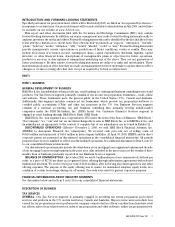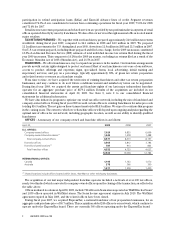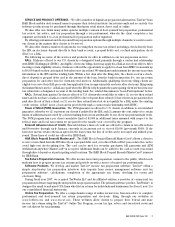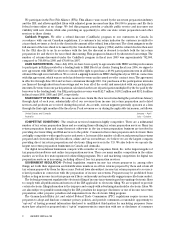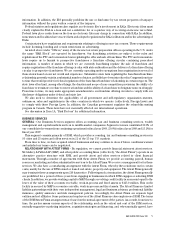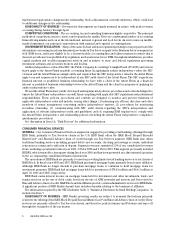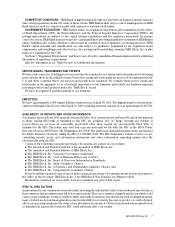HR Block 2009 Annual Report Download - page 14
Download and view the complete annual report
Please find page 14 of the 2009 HR Block annual report below. You can navigate through the pages in the report by either clicking on the pages listed below, or by using the keyword search tool below to find specific information within the annual report.other related services to the public. Commercial tax return preparers and electronic filers are highly competitive
with regard to price and service. Our digital tax solutions businesses also compete with in-office tax preparation
services and a number of online and software companies, primarily on the basis of price and functionality.
Federal and certain state taxing authorities currently offer, or facilitate the offer of, tax return preparation and
electronic filing options to taxpayers at no charge. In addition, many of our direct competitors offer certain free
online tax preparation and electronic filing options. We have free offerings as well and prepared 788,000 federal
income tax returns in fiscal year 2009 at no charge as part of the FFA. Government tax authorities and direct
competitors may elect to expand free offerings in the future. Intense price competition, including offers of free
service, could result in a loss of market share, lower revenues or lower margins.
See tax returns prepared statistics included in Item 7, under “Tax Services.”
BUSINESS SERVICES
The RSM alternative practice structure involves relationships with Attest Firms that are subject to
regulatory restrictions and other constraints. Failure to comply with these restrictions, or operational
difficulties involving the Attest Firms, could damage our brand reputation, lead to reduced earnings and
impair our investment in RSM.
RSM’s relationship with the Attest Firms requires compliance with applicable regulations regarding the practice of
public accounting and auditor independence rules and requirements. Many of RSM’s clients are also clients of the
Attest Firms. In addition, the relationship with the Attest Firms closely links our RSM McGladrey brand with the
Attest Firms. If the Attest Firms were to encounter regulatory or independence issues pertaining to the alternative
practice structure or if significant litigation arose involving the Attest Firms or their services, such developments
could have an adverse effect on our brand reputation and our ability to realize the mutual benefits of our
relationship. In addition, a significant judgment or settlement of a claim against the Attest Firms could (1) impair
M&P’s ability to meet its payment obligations under various service arrangements with RSM and to repay amounts
borrowed under the revolving credit facility it maintains with us, (2) impact RSM’s ability to attract and retain
clients and quality professionals, (3) have a significant indirect adverse effect on RSM, as the Attest Firm partners
are also RSM employees and (4) result in significant management distraction. This in turn could result in reduced
revenue and earnings and, if sufficiently significant, impairment of our investment in RSM.
RSM receives a significant portion of its revenues from clients that are also clients of the Attest Firms. A
termination of the alternative practice structure between RSM and the Attest Firms could result in a
material loss of revenue to RSM and an impairment of our investment in RSM.
Under the alternative practice structure, RSM and the Attest Firms market their services jointly and provide
services to a significant number of common clients. RSM also provides operational and administrative support
services to the Attest Firms, including accounting, payroll, human resources, marketing, administrative services
and personnel, and office space and equipment. In return for these services, RSM receives a management fee and
reimbursement of certain costs, mainly for the use of RSM-owned or leased real estate, property and equipment. If
the RSM/Attest Firms relationship under the alternative practice structure were to be terminated, RSM could lose
key employees and clients. In addition, RSM may not be able to recoup its costs associated with the infrastructure
used to provide the operational and administrative support services to the Attest Firms. This in turn could result in
reduced revenue, increased costs and reduced earnings and, if sufficiently significant, impairment of our
investment in RSM.
CONSUMER FINANCIAL SERVICES
We are subject to extensive government regulation, including banking rules and regulations. If we fail to
comply with applicable banking laws, rules and regulations, we could be subject to disciplinary actions,
damages, penalties or restrictions that could significantly harm our business.
The OTS can, among other things, censure, fine, issue cease-and-desist orders or suspend or expel a bank or any of
its officers or employees with respect to banking activities. Similarly, the attorneys general of each state could
bring legal action on behalf of the citizens of the various states to ensure compliance with local laws.
HRB Bank is subject to various regulatory capital requirements administered by the OTS. Failure to meet minimum
capital requirements may trigger actions by regulators that, if undertaken, could have a direct material effect on HRB
Bank. HRB Bank must meet specific capital guidelines involving quantitative measures of assets, liabilities and
certain off-balance sheet items as calculated under regulatory accounting practices. A bank’s capital amounts and
classification are also subject to qualitative judgments by the regulators about the strength of components of its
capital, risk-weightings of assets, off-balance sheet transactions and other factors. Quantitative measures
established by regulation to ensure capital adequacy require HRB Bank to maintain minimum amounts and
ratios of tangible equity, total risk-based capital and Tier 1 capital. In addition to these minimum ratio
requirements, HRB Bank is required to continually maintain a 12.0% minimum leverage ratio through fiscal year 2012.
10 H&R BLOCK 2009 Form 10K



